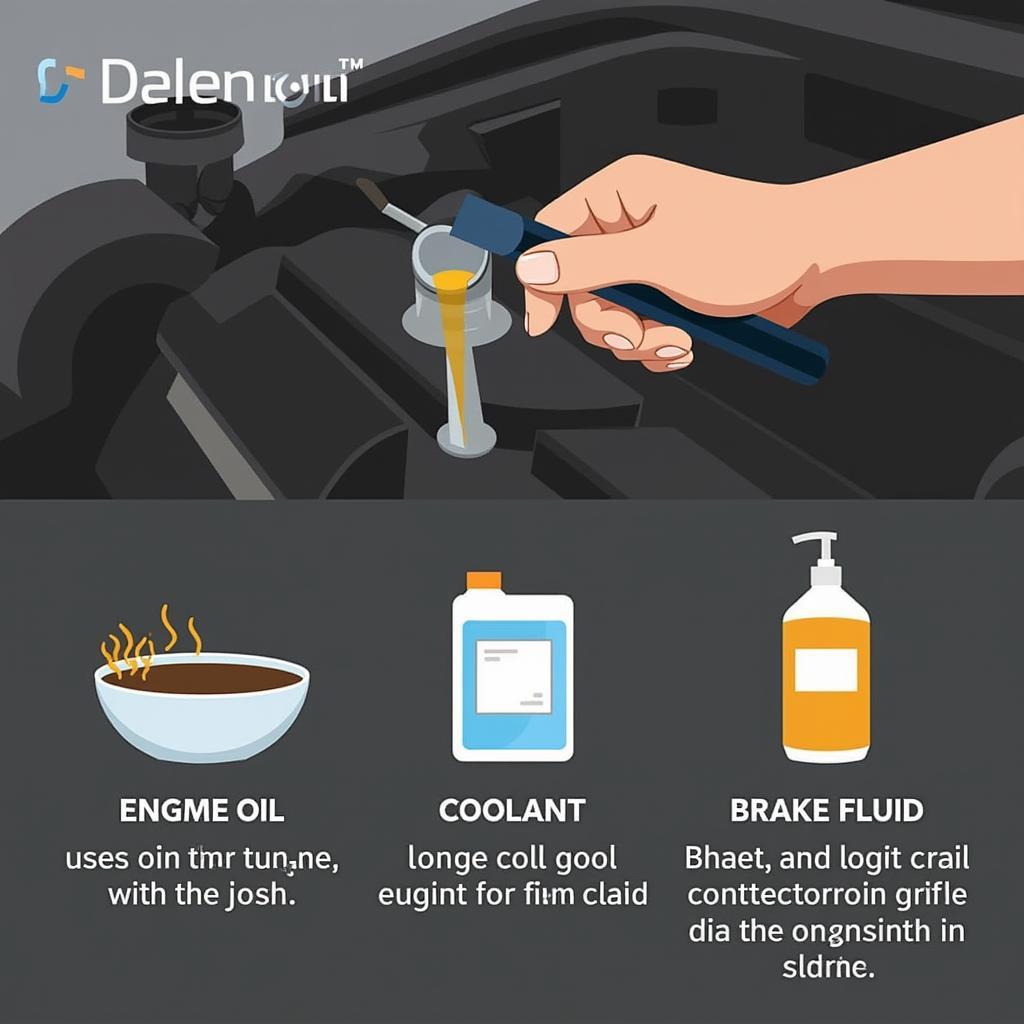Maintaining your car through regular servicing is crucial for its longevity, performance, and safety. Knowing How To Service A Car, even at a basic level, can save you money and ensure your vehicle runs smoothly. This guide provides a comprehensive overview of car servicing, from simple checks you can do yourself to more complex procedures best left to professionals.
If you’re eager to dive into DIY car maintenance, check out our detailed guide on how to service a car yourself.
Essential Car Service Tasks
Several key tasks are integral to any car service, whether performed at home or by a mechanic. These tasks address crucial components for safe and efficient vehicle operation.
Checking Vital Fluids
Regularly checking your car’s fluids is a fundamental aspect of car maintenance. This includes engine oil, coolant, brake fluid, power steering fluid, and transmission fluid. Each fluid has a specific role, and maintaining correct levels is vital. Low levels can indicate leaks or other issues that require immediate attention.
- Engine Oil: The lifeblood of your engine, lubricating moving parts and preventing excessive wear. Check the oil level using the dipstick, ensuring it falls within the designated range.
- Coolant: Keeps the engine from overheating. Check the coolant level in the reservoir and top it up if necessary.
- Brake Fluid: Essential for proper brake function. Low brake fluid can be a sign of a leak in the braking system, which is a serious safety concern.
- Power Steering Fluid: Ensures smooth steering operation. Check the fluid level in the power steering reservoir.
- Transmission Fluid: Keeps the transmission running smoothly. Check the transmission fluid level using the dipstick, following the instructions in your car’s owner’s manual.
 Checking Car Fluids: Engine Oil, Coolant, and Brake Fluid
Checking Car Fluids: Engine Oil, Coolant, and Brake Fluid
Inspecting Filters
Filters play a critical role in keeping your car running efficiently. They prevent contaminants from entering vital systems.
- Air Filter: Cleans the air entering the engine, preventing dirt and debris from causing damage.
- Cabin Air Filter: Filters the air entering the cabin, ensuring clean air for passengers.
- Oil Filter: Removes contaminants from the engine oil, extending the life of the engine.
Regularly replacing these filters is essential for optimal performance.
You can find a helpful step-by-step guide on our site: how to service a car step by step.
Examining Brakes and Tires
Brakes and tires are crucial for safety. Inspecting them regularly can prevent accidents.
- Brake Pads: Check the thickness of the brake pads to ensure they are not worn down.
- Brake Rotors: Look for signs of warping or damage.
- Tire Pressure: Maintain correct tire pressure for optimal fuel efficiency and handling. Use a tire pressure gauge to check the pressure and inflate or deflate as needed.
- Tire Tread Depth: Ensure sufficient tread depth for proper grip on the road.
When to Service Your Car
Most manufacturers recommend servicing your car every 6,000 to 12,000 miles or every six months, whichever comes first. However, driving conditions and your car’s specific requirements may necessitate more frequent servicing.
For a convenient resource, consider downloading our how to service a car pdf.
Professional vs. DIY Car Servicing
While some basic maintenance tasks can be performed at home, more complex procedures require specialized tools and expertise. A professional mechanic can diagnose and repair issues effectively, ensuring your car is in optimal condition.
Benefits of Professional Car Servicing
- Expertise and Specialized Tools: Mechanics have the training and equipment to handle complex repairs.
- Thorough Inspection: A professional service includes a comprehensive inspection of all critical components.
- Warranty Protection: Servicing your car at a reputable shop can help maintain your warranty.
“Regular professional servicing is an investment in your car’s long-term health and performance,” says automotive expert, David Miller, ASE Certified Master Technician. “It’s the best way to prevent costly repairs down the road.”
Conclusion
Understanding how to service a car is vital for every car owner. Regular maintenance ensures safety, reliability, and optimal performance. While some tasks can be handled at home, professional servicing offers expertise and a comprehensive approach to car care, ultimately saving you money and headaches in the long run. Remember to consult your car’s owner’s manual for specific service recommendations.
FAQ
- How often should I change my oil?
- What are the signs of worn brake pads?
- How do I check my tire pressure?
- What is included in a basic car service?
- How do I know if my car needs a tune-up?
- What are the benefits of using synthetic oil?
- How can I improve my car’s fuel efficiency?
Common Car Service Scenarios
- Dashboard Warning Lights: If a warning light illuminates, consult your owner’s manual and seek professional help if needed.
- Unusual Noises: Any unusual noises coming from your car should be investigated immediately.
- Performance Issues: Decreased fuel efficiency, rough idling, or difficulty starting can indicate underlying problems.
For those who prefer visual guides, consider checking out our how to service a car wikihow. It provides illustrative instructions for various maintenance tasks.
Further Assistance
For more information on car maintenance and repair, explore our other articles on car care tips and troubleshooting guides.
Need help? Contact us via WhatsApp: +1(641)206-8880, or Email: [email protected]. Our customer support team is available 24/7.